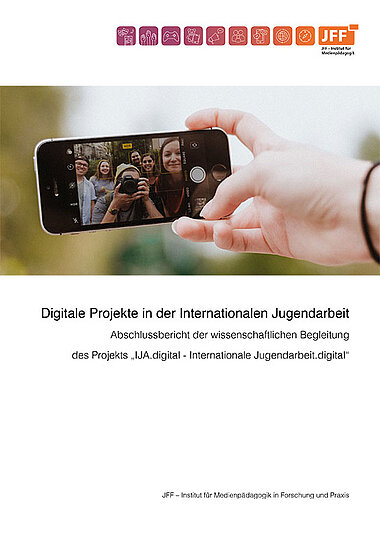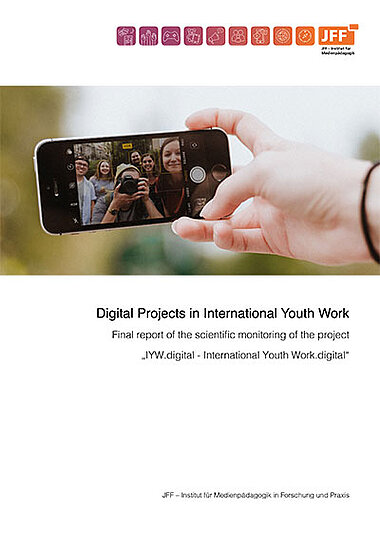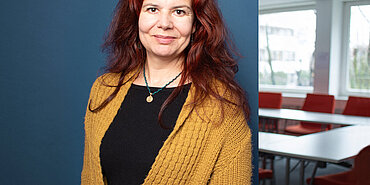ijab.de: Lotte, during the lockdown you observed and analysed digital youth work in Flanders. Your research was commissioned by the Flemish Department of Culture, Youth and Media and JINT, the National Agency for Erasmus+ Youth and the European Solidarity Corps. What were your findings?
Lotte Vermeire: When the pandemic began, most youth workers had no experience with digital youth work and had to work their way through it by trial and error. They had to find out what would be interesting for their target group by talking to young people. Online formats have been shown to have unexpectedly great potential for counselling. For traumatised young people, the threshold to talk to someone and get support is lowered because in an online session, they can remain anonymous.
ijab.de: Franziska, do you recognise some of this in what the JFF observed in the international context?
Franziska Koschei: Definitely. Trial and error is also what we observed. Especially in the beginning, the team members gained experience by trying out a number of approaches. But we also found that technical expertise is not that significant when it comes to implementing digital projects. An open and positive attitude towards digital technologies is more relevant. Skills in dealing with online tools in the work context are then acquired through actual pedagogical work. Like Lotte, we also found that the barriers to access to online activities are lower, for example for young people who would normally hesitate to take part in a youth exchange because it is difficult for them to interact with new people or because they don’t like travelling.
Openness to digital formats
ijab.de: After the many experiments during the pandemic, a certain fatigue can be said to have set in. What will remain of the joy of experimentation? Can it be sustained ?
Lotte Vermeire: During the pandemic, everyone flicked the switch and pivoted to digital formats. They had few other options during that time, but the question is really whether it will stay that way. I can't predict that, but I can echo what youth workers have told us. A lot of them feel positive about the potential of digital formats. Most young people don’t even consider the question because they do not distinguish between online and offline. For them, their phone is a natural communication tool that connects them with other people and prevents social isolation. Policymakers, too, have called for digital youth work to become more established. The sustainability you mentioned will take time. For example, more attention needs to be given to building capacity and developing an infrastructure for purchasing or borrowing hardware and software, specifically to prevent the digital exclusion of young people with fewer means. In any case, the topic is being talked about at all levels – European, national and regional.
Franziska Koschei: We will also need the support of the research community. It makes sense to observe these developments scientifically and to bring structure to the experience being gathered in digital projects. This creates a scientific foundation on which strategies and projects can be further developed. So we need more research that will help to bring together the best of both worlds - online and offline.
ijab.de: In your respective studies, you highlight the importance of digital youth work for youth participation. Can you elaborate on that?
Franziska Koschei: We saw that young people were able to participate in organising and designing activities through digital tools. Some projects also took account of the participants' preferences for certain online tools. But in theory, the tools offer even more possibilities for participation: for instance, they enable young people to take on certain tasks and hence actively apply their skills. That said, the tools are not the only factor. Young people should be listened to carefully as they express their interests.
Lotte Vermeire: The relationship between young people and youth workers is not hierarchical. Young people like to share their knowledge and youth workers can listen. This experience is highly motivating for young people, and it can produce astounding results. Discord, a tool for digital exchange, has so far mostly appeared in the educational debate in the context of gaming addiction. While it is indeed a gaming platform, it can also be used for many other purposes, such as currently youth work. Young people don’t have to feel like outcasts or addicts when they use Discord because its negative connotations have been lifted. Participation works better when it is understood bottom-up. Communication can take place through many devices and platforms, even a PlayStation, and we should listen carefully to young people's suggestions. This can also have an impact in the political space when we think about e-participation.
More is possible – but how?
ijab.de: Your research concludes that the potential of digital tools is not yet fully leveraged. What is required for that to happen?
Franziska Koschei: We need more exchange of knowledge and experience. At the moment, a lot is happening when it comes to the digitalisation of activities, be it in the non-formal or in the formal context. I can already see this in my work. At JFF, our focus is not just on digital international youth work, but also on digital education in primary schools or digital street work. We’re seeing a lot of different methods there, but also commonalities. We need to bring all this together and e what is transferable.
Lotte Vermeire: I fully agree. We have to develop the capacities of the youth work organisations. This is a task for the organisations themselves, but they also need government support. A database of good practices could help here. Youth workers have good soft skills, but many don't have much confidence when it comes to operating in the digital space. That needs to change. And we have to keep pointing out that digital youth work offers additional benefits to society and that we don’t expect youth workers to be digital experts. Also, youth work as we know it should not be abolished; instead, it should be adapted to the needs of the target groups. Non-formal education and its further development remains a key task.
ijab.de: Let's look at the international context. What are the implications of this when we think about digital youth work internationally – for example, in relation to international youth work? And to what extent can Europe provide input?
Lotte Vermeire: Digital youth work can contribute to every field of youth work, including international youth exchanges. The needs are often the same. The EU has issued recommendations, but there is a lack of guidance, support and structures so the national structures are often all we have.
Franziska Koschei: That's right. It would also be good to have more guidance for practical work – the more concrete, the better. The European Guidelines for Digital Youth Work, which are based on the report of the EU Expert Group on Digitalisation and Youth, could provide orientation. In any case, Europe could help us learn from each other.
One of Lotte Vermeire's key studies on Digital Youth Work is available here: https://journals.oslomet.no/index.php/seminar/article/view/4701/4355
The project "IJA. digital" was carried out by IJAB in cooperation with JFF - Institute for Media Education in Research and Practice, funded by the Federal Ministry for Family Affairs, Senior Citizens, Women and Youth (BMFSFJ), German-French Youth Office (DFJW), German-Polish Youth Office (DPJW), ConAct - Coordination Centre German-Israeli Youth Exchange, Tandem - Coordination Centre German-Czech Youth Exchange as well as the Foundation German-Russian Youth Exchange and supported by YOUTH for Europe, German-Greek Youth Office (DGJW) and German-Turkish Youth Bridge.
The final report of the scientific monitoring of the project "Internationale Jugendarbeit.digital" can be downloaded here:




![[Translate to Englisch:] [Translate to Englisch:]](/fileadmin/_processed_/3/d/csm_IJA_digital_Start_819f0d815c.png)
![[Translate to Englisch:] [Translate to Englisch:]](/fileadmin/_processed_/6/d/csm_2021_02_19_wadi-lissa-6coEA1R1Ecs-unsplash_ef44d544f3.jpg)


